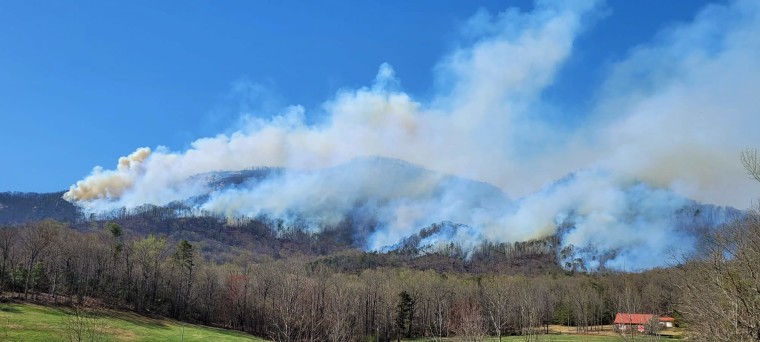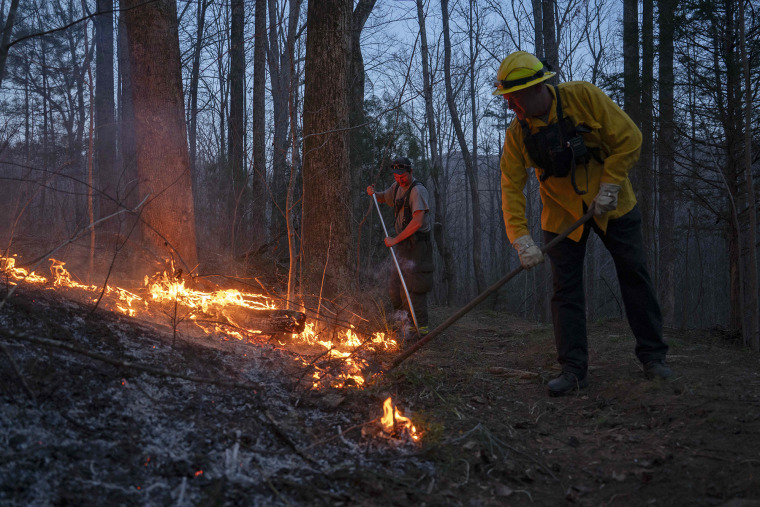Crews in the Carolinas continue to battle major wildfires that have scorched thousands of acres, forced evacuations and destroyed homes.
The largest of North Carolina's blazes, the Deep Woods Fire, has burned 2,545 acres in the Green River Gorge area of western North Carolina and was 0% contained, according to the state Department of Agriculture and Consumer Services. It started Wednesday.
The Black Cove Fire has scorched more than 2,000 acres in a separate part of the Green River George area since it started Wednesday, and it was also 0% contained, the department said.
Those two fires have each destroyed one home and two structures, officials in Polk County said in a statement. Evacuations remain in effect for specific areas near both blazes, officials said Monday.
The Fish Hook Fire near Lake Adger was at 199 acres and 50% containment, an echo of weekend numbers, the agriculture and consumer services department said. Evacuees near the blaze were allowed to return, it said.
The three fires were being managed together as a "complex fire," with the federal government deploying a Complex Incident Management Team — often reserved for the country's largest wildfires and composed of state and local fire officials — according to the National Interagency Fire Center.
The Oregon Forestry Department sent 26 firefighters who arrived Sunday and charged into battle against the Black Cove Fire, the department said in a statement. Firefighters also came from South Carolina, Michigan, Montana, Tennessee, South Dakota and California, the North Carolina Department of Agriculture and Consumer Services said.
The Federal Emergency Management Agency approved a grant to help the state respond to the blazes, Gov. Josh Stein said over the weekend. The Polk County government declared a state of emergency Wednesday and noted that a statewide prohibition on outdoor fires was still in effect.
The Federal Aviation Administration has restricted the skies over the fires to firefighting aircraft, the department said, and flying drones over wildfires is already prohibited under North Carolina law.
North Carolina Emergency Management said in a statement that a Black Hawk helicopter from the North Carolina National Guard was staged and ready in case firefighters needed to be rescued.
A cold front moved through the region Monday morning but provided only enough rain — 0.05 inches — to allow firefighters time to tidy up fire lines, the department said. Windy, dry conditions returned quickly, "evaporating the moisture," it said.
Smoke was likely to cause low visibility at times for areas of the western Carolinas, officials said. Debris left behind by Hurricane Helene was hindering access to some areas and providing fuel for fires in both states, they said over the weekend.
South Carolina Gov. Henry McMaster declared a state of emergency Saturday because of the 1,300-acre Table Rock fire, which is in Pickens County in the northwestern part of the state. An emergency declaration allows state resources and other aid to be used.
A statewide prohibition on outdoor fires was also in effect, the governor's office said.
The Pickens County blaze has no containment, the South Carolina Forestry Commission said.
Pickens County officials said in a statement that a 3-mile prescribed burn took place Sunday and that more prescribed fire was likely Monday, with smoke causing low visibility for motorists in the region.
Tractor crews and hand crews were constructing fire lines to contain the inferno, Pickens County said in an update on its website.
Evacuation recommendations covering an estimated 100 residences near the fire remained in effect, the South Carolina Forestry Commission said in a series of statements since Sunday.

Another large wildfire is burning near Persimmon Ridge in Greenville County, South Carolina. The fire started Saturday and has grown to more than 800 acres with no containment, the commission said.
The two fires were being managed together as the Table Rock Complex Fire, it said. Late Sunday, a little more than 10 miles separated the blazes.
At least six aircraft will be deployed Monday for water-dropping missions to both infernos, the forestry commission said. Among them are two South Carolina National Guard Black Hawk helicopters, it said.
Strong winds, low humidity and moderate to long-term drought conditions across the region were fueling the fires.

Following Monday's brief spritz, dry, windy weather was expected to return to the region for the rest of the workweek, the National Weather Service office for the western Carolinas said.
It issued a hazardous weather outlook that says, "The combination of low relative humidity and drier fuels will increase fire danger Tuesday through Saturday."
Other parts of the country will be hit with severe weather. In southeast Louisiana, a severe thunderstorm watch is in effect. Strong thunderstorms will be possible throughout Monday along the I-10 corridor through northern Florida.
The Great Lakes to New England will get a wintry weather mix Monday. Five million people were under winter alerts for snow.
This weekend, parts of the Midwest, the Ohio Valley, the Southeast and the Gulf Coast could get significant and widespread severe weather.

